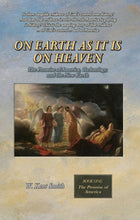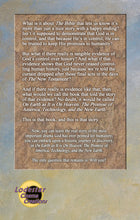ON EARTH AS IT IS ON HEAVEN
BOOK SUMMARY
Because Jesus said His Kingdom isn’t “of this world,” many assume that only Heaven is worthy of being pursued, and that the Earth should be forever viewed as an enemy of God’s Kingdom. But nothing could be further from the truth.
Jesus didn’t say the Earth itself was unworthy or ungodly; He simply stated that His Kingdom wasn’t “of this world.” What’s more, the phrase “of this world,” really just means it’s not “from this world.” Saying it’s not “of” implies an inherent incompatibility between Earth and this other place; but saying it’s not “from” just lets us know it didn’t originate on Earth but instead comes from somewhere else.
So, while one word—of—leads us to the traditional assumption that we need to leave here to go where Jesus is, the other word—from—lets us know that it came from another place and is now taking up residence as a new frontier of God’s expanding Empire.
This is the story of that new frontier and of that expanding Empire.
Now, you can learn the true story of the most important drama God has ever penned for humanity; you can embark upon a historic journey of discovery, in On Earth as It is On Heaven: The Promise of America, Technology, and the New Earth.
The only question that remains is: Will you?
BOOK PREVIEW
America, in the year 2023, stands at a crossroad. But certainly anyone who has studied the history of America knows this is by no means its first crossroad. In fact, one of the classic earmarks that makes America unique in the history of nations is the clear-cut nature of these crossroads: 1492, 1620, 1776, 1865, 1918, 1945, all mark critical turning points in American history, at which time the nation went decisively in one direction instead of another. Instead of succumbing to the rule of the tyrant, Americans chose the rule of law; instead of knuckling under the way of tyranny, we chose the way of liberty; and instead of extending the hand of intolerance, we chose the hand of tolerance…
However, while men and women of character, both in America and around the world, embrace law, liberty, and tolerance, we know all too well that this never marked the end of the story; it was just the beginning, which brings us to America’s next crossroad. In the past, tyrants, tyranny, and intolerance had been the norm for most of the world’s population, but now they represent isolated pockets. In the past, the rule of law, the way of liberty, and the hand of tolerance were in the minority, while today they are so much more prevalent, thanks to all that is good and right about America and its allies around the world. But sadly, since the dark days of the 1960s, in the aftermath of JFK’s assassination, the Vietnam War, and Watergate, the American landscape is awash with a terrible enemy: that enemy is cynicism…
We need an antidote, then, for the disease of cynicism, which is currently eroding every level of our society. Widespread cynicism has many people criticizing our most important institutions, from our government, to our educational system, from our families, to our houses of worship. They are being criticized because they’re said to be, among other things, racist, misogynist, and intolerant, and therefore they must be dismantled. According to the critics, nothing short of an outright revolution is required.
The problem with such demands, though, is they overlook a critical aspect of the discussion, which is that while institutions are made up of people, institutions themselves aren’t capable of racism, misogyny, or intolerance. Only people are capable of that. And as we all know from our own experience, not everyone is guilty of such things, just some. Some people are racist, some people are misogynist, some people are intolerant; that is without question. So to insist on dismantling institutions that have served not only America but the world on the presumed basis that they’re racist, misogynist, or intolerant seems to miss the point entirely. Far better to seek reformation of the things that can be reformed, the things which comprise these institutions, which is to say, people…
Taking a page from God’s own playbook—although a counterfeit version—the enemies of America have taken a new approach in their revolutionary effort. Rather than attack America in a head-on assault, they too are seeking to do their work from the inside out. But instead of appealing to “the better angels of our nature,” they’re pumping their favorite poison into every stream of public and private life: cynicism. Speaking of this very method of attack, Abraham Lincoln predicted long ago, in a speech to a group in Springfield, Illinois 1838:
“At what point then is the approach of danger to be expected? I answer, if it ever reaches us, it must spring up amongst us. It cannot come from abroad. If destruction be our lot, we must ourselves be its author and finisher. As a nation of freemen, we must live through all time, or die by suicide.”
Observations like this are vital to a work of this nature, because while it’s presented with an acute awareness of the political upheaval of the day, it’s by no means a political treatise about revolution, any more than it’s a psychological treatise about cynicism. This is, after all, a work about the prayer of Jesus that urges the God of Heaven to have His will be done on Earth. It’s about that expanding Empire—the coming of God’s Kingdom that the prophets of old spoke of and that Jesus sent into full swing with His death and resurrection. And it’s about the role that America, technology, and the New Earth are playing in this unfolding drama of the ages.




